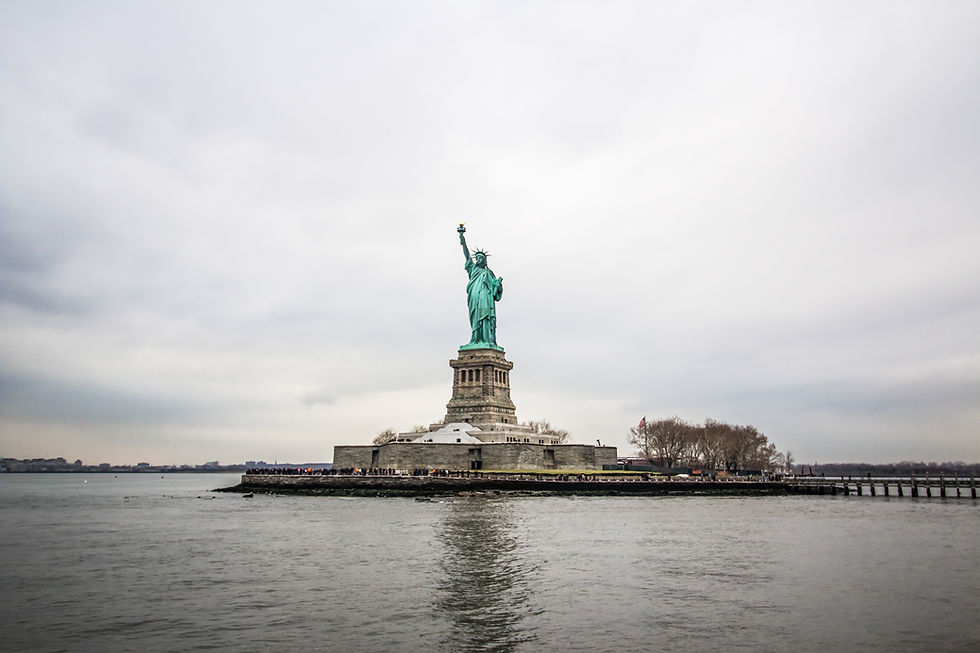Oliver Calls For End to Cannabis Prohibition
- Kelsey Lyon
- Apr 20, 2023
- 3 min read
ATLANTA - Libertarian presidential hopeful Chase Oliver urges everyday Americans to challenge the government’s failed prohibition on cannabis, just as everyday Americans did with alcohol prohibition after seeing greater damage from prohibition itself than the drug.
“That’s what the drug war supposedly seeking to address is the amount of addiction that we have in this country,” Oliver says. “You’re never going to do that with the boot of the police state. You’re going to do that with compassion and empathy, and actually treating addicts with respect and doing things like harm-reduction strategies that allow us to create trust in our communities so that addicts who need help can reach out and get it.”
Cannabis and its derivatives have been used as medicine for centuries, the United States included.
However, by the 1900s, people became frustrated with sellers of elixirs and other products presented as medicines, who made exaggerated if not openly deceitful promises. This led to the 1906 Pure Food and Drug Act, which limited the promises made on labels. Marijuana tinctures and other cannabis products fell under the act.
Attention shifted to alcohol. The 18th Amendment that created Prohibition went into effect in 1920, and counter to the expectations of those who sought to end problems associated with alcohol, Prohibition only worsened matters.
“It created rise to all kinds of criminal enterprises, all kinds of black markets that created alcohol that was frankly more dangerous to consume, more dangerous to go buy because you were dealing with a criminal element, and it funneled lots of money to people who caused lots of havoc in many communities across the country,” Oliver says.
“When you make something illegal, the only people who will be engaging in that marketplace are those who do not care about the law. And by its very essence, that creates a criminal element, criminality creates violence.”
By 1933, Americans had enough and passed the 21st Amendment repealing Prohibition.
Soon after, attention shifted to smokeable marijuana. Possession or transfer of smokeable marijuana became illegal in 1937 under the Marijuana Tax Act. Those people opposing recreational marijuana noted that it was used by Mexican refugees, Blacks, lower-class whites, and eventually, Beatniks and hippies.
In 1970, President Richard Nixon pushed Congress to classify marijuana and cannabis products as Schedule I drug – ones with no medical value – a list that also includes heroin and LSD. By the 1980s, First Lady Nancy Reagan’s Just Say No campaign ignited the aggressive anti-drug campaigns by both government and education groups starting under President Ronald Reagan.
That is changing. Currently, 37 states and Washington D.C. argue that the drug is medically useful and allow cannabis products for medical purposes. Every day people became activists when they saw that cannabis helped patients suffering from glaucoma, cancer, and AIDS.
As for just saying no, 21 states have said yes to legalized recreational use for adults and 10 more have decriminalized small amounts for adults. Oliver says ending the drug war ironically will reduce crime, just as ending alcohol prohibition lessened the crime that came with prohibition.
“When you criminalize each and every activity, you encourage more criminality, you encourage more danger, and you encourage less safety in your community. We need to be ending the prohibition of drugs and actually looking toward fixing this issue but not using a police state to do it because that is a failure. We have seen it fail time and time again," he said.
“As Libertarians, I like to say we’re opposed to all wars, and that includes the war on drugs. We know there’s a better way to do it, and that involves human liberty.”
Oliver, 38, announced his bid to become the presidential nominee of the Libertarian Party earlier this month. Oliver is the first openly gay Senate candidate in Georgia, where he garnered over 80,000 votes in 2022, forcing a runoff between his Republican and Democratic opponents.
Oliver’s national attention grew following his debate with incumbent Sen. Raphael Warnock and an empty podium set aside for opponent Herschel Walker. Broadcast coverage includes PBS, CNN, Fox Business, and CSPAN. Print coverage includes The New York Times, The Washington Post, Bloomberg, and Rolling Stone, which labels him the “Most Influential Libertarian.”
Oliver is available for media interviews, university journalism, and communications students.
To learn more about Chase Oliver, donate, or volunteer, please visit votechaseoliver.com.
###
SOURCES
Grass Roots: The Rise and Fall of Marijuana In America.
Emily Dufton
Marijuana Legalization: What Everyone Needs to Know.
Jonathan P. Caulkins, Angela Hawken, Beau Kilmer, Mark R. Kleiman
https://disa.com/maps/marijuana-legality-by-state
Disa




Comments